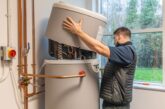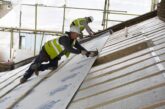
Uptake of renewable technology amongst plumbing and heating engineers has risen dramatically following growing demand from homeowners, new research shows. In fact, last month the industry body, MCS, reported that there has been a record number of renewable energy installations in the first six months of 2023 and heat pumps reached a peak number of 3,000 household installations a month for the first time.
Furthermore, a survey of 150 domestic heating installers, commissioned by Polypipe Building Products, found that 41% of installers who historically install oil and/or gas have now begun installing renewables. On top of this, of the heating installers who still mainly install oil and/or gas, 37% said they’re currently looking into more renewables and associated training and 38% said they’re considering moving into renewables.
While the wider shift to renewables is being driven, in part, by updates to Part L of the building regulations and the upcoming Future Homes Standard, customer demand is also playing a key role. A third (33%) of installers said their customers are generally very passionate about reducing carbon emissions, and 29% said their customers only ask for renewable energy.
Some of the demand for renewables is being driven primarily by the economic climate and cost of energy. 18% of installers said their customers are interested in renewables, but mainly because they want to reduce gas bills, and 17% put their customers’ interest primarily down to prices.
In addition, almost a quarter (23%) of installers said that their customers ask them about legislation and are very interested in reducing carbon emissions, while 19% say their customers are interested in reducing carbon emissions, but don’t ask about legislation.
Dan Love, Head of Commercial at Polypipe Building Products, said: “It is brilliant to see that more consumers are gaining confidence in renewables and are looking towards them to decrease hefty energy bills and lower carbon emissions. The fact that heating engineers are adapting their service offerings in line with this, and the updates to Building Regulations, is excellent and to hear that over 40% are now installing renewables is a big step in the right direction. While this is all positive news, as an industry, we must continue to push this expansion in order to meet our shared national targets.”
The research also found that a small number of installers are already taking a renewables-first approach, with 5% saying their company predominantly installs renewables. However, some installers remain steadfast in what they know, with 11% of those mainly installing oil and/or gas saying they have no plans to look into renewable heating solutions.
One of the barriers to uptake is a lack of industry training. 30% of installers said they want to book a heat pump training course but can’t find one anywhere, and almost a quarter (24%) said that there are not enough heat pump training courses available, despite them looking.
There also appears to be a segment of the installer community that remains reluctant to pursue training on heat pumps, with a fifth (20%) saying they haven’t looked into training courses and have no intention to, and 19% saying they haven’t because they don’t like heat pumps and believe there are better alternatives.
Indeed, 11% of installers said they won’t be undertaking heat pump training because they believe there are better renewable alternatives and 13% said their refusal was because they had no interest in renewables at all.
Nonetheless, the survey found that many installers have already completed, or sought out, training on renewables such as heat pumps. Almost one fifth (17%) said they have had heat pump training and feel confident in the installation process and 21% said they’ve had heat pump training, but so far there has been minimal demand from customers. A further 22% said they’re already booked onto a heat pump training course, but are currently waiting to attend.

Commenting on the findings, Dan Love, Head of Commercial at Polypipe Building Products said, “While it’s positive to find that many engineers are undergoing training and carrying out more renewable installations, it is clear that a lack of training has been an issue for many. Hands-on advice will play a huge role in supporting installers through the transition to renewable energy and we know that a number of manufacturers are investing heavily to provide this education. At Polypipe Building Products, we not only offer training, but our technical and site support teams are also on hand to help with the initial specification and design of low energy heating systems, and also to attend site should you need in-person advice.
“While many installers feel that there are better alternatives to heat pumps, they are a potential solution that should not be ignored. Over the past few years, innovations in the industry mean they are now far more technologically advanced, quieter than ever, and able to work at full efficiency when paired with low energy emitters such as UFH. Plus, with the Future Homes Standard looming, which will set a carbon reduction target of 75-80% compared to the 31% of Part L, installers must consider all options available to them in order to remain at the forefront of the industry.”
For helpful resources on the updates to Part L and for further information, please visit: https://www.polypipeufh.com/futurehomeshub/







